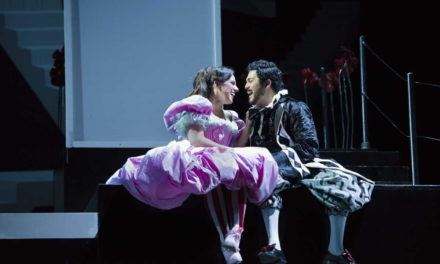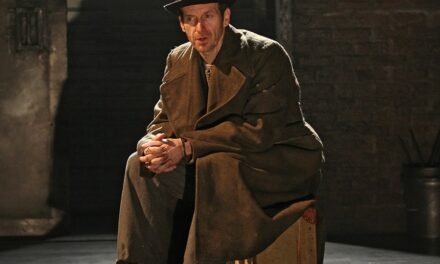It’s good to be shaken off our predictable paths, and Ithaca’s Cherry Arts productions do that regularly –– with a sense of whimsy, irony, and wonder. Last week two highly intimate one-acts took us into new spaces, introducing the work of the Argentine playwright and filmmaker Santiago Loza.
Though Loza, 46, is known throughout Latin America, this is the first time his plays have been translated into English –– courtesy of Cherry artistic director Sam Buggeln working with Buenos Aires playwright Ariel Gurevitch and Alejandro Tantanian, artistic director of Buenos Aires’ Teatro Cervantes.
As the new waterside Cherry Artspace won’t be completed until summer, this production was held at the Community School for Music and Arts. The high-ceiling hall, more fit for medieval banqueting than theatrical ventures, was well used by set designer Daniel Zimmerman, who creatively transformed sections of the space.
For Winter Animals, in which a father, a rural rancher, visits his bookish son’s tiny, spare apartment in Buenos Aires, tiered viewers surrounded a small area in one dim corner of the vast room. The low lighting, by E.D. Intemann, effectively suggested the son’s desolation and created a sense of intimacy, even complicity, with what transpired.
The father’s few days stay is awkward for both men, who want to connect but are painfully inept. Johnny Shea’s splendidly delivered son is terse, withdrawn, abrupt and grudging in his communication, yet there’s affection in his willingness to please (serving a late-night cup of coffee; agreeing to their earlier trip to the zoo).
As his father, Dean Robinson is irritatingly but forgivably paternal –– loquacious, self-absorbed, full of advice tempered with apologies and good intentions. This brilliant portrait is incredibly human, and that’s the power of Loza’s characterizations –– the latter part of magical realism.
The absurd touch here comes early on: Inside the small apartment’s refrigerator lives a young woman. Oh, and she’s nude. There’s a thematic connection we learn later: As a boy, the son riffled through his father’s private things and discovered, to his fascination and disgust, a pen, which when tipped, revealed a woman’s clothed figure turning to nudity. (Many fathers of a certain era had those pens.)
Sexuality is a bond men share, and the father, fond of his wife and appreciative of all women, talks about it openly, unintentionally unnerving his son, who may be homosexual. One man exposes, pokes, explores, advises, reminisces, shares; the other conceals and retreats –– their ages and experiences worlds apart.
The woman –– far beyond a symbol of sexuality –– emerges as a confidante and protectress of both. When Helen T. Clark entered in a pale greenish light, for a moment she seemed clothed in thin parchment. Skin without blemish, a woman-girl’s body, remarkably perfect, her nakedness a direct counter to the men’s swaddled communication. Clark was poised, flirty and charming in speech but asexual in her body –– a fascinating, understated performance.
Sam Buggeln thoughtfully directed these three fine actors as they explored layers of connection and necessary distance. When the insomniac son finally falls asleep on his father’s chest, the woman asks the man if he’s worried his son will turn out weird. “No,” he replies, “I’m worried he’s going to turn out sad.”
That kind of startling honesty marks Loza’s work, seen again in a different light in Nothing to Do with Love (Makes Me Envious), the second one-act, here directed by Norm Johnson. This time the audience occupies a close semicircle near the main stage, and the sole actor, Susannah Berryman, stands below the stage, almost in our midst.
She’s not wholly alone –– there’s a dressmaker’s dummy she’s talking to, chattering animatedly, recalling the most memorable experience of her life. An accomplished seamstress, she was once sought out by the famous Argentine singer and film star, Libertad Lamarque, known as “The Sweetheart of the Americas.”
A large black and white photo of the glamorous Libertad hangs onstage above her on the right; an equally famous portrait on the left, of Eva Perón. Between those two women, rivals in fame and revered by Argentines to a degree we can barely grasp, the dressmaker weaves her story.
Having constructed the most amazing gown from precious fabric for Libertad, she finds herself visited by a man announcing “La Señora” –– and to her astonishment, Evita sweeps into the room. She’s heard of the seamstress’ skill and seeks something –– when her eye lands on the nearly finished dress. She pronounces it hers.
The dilemma the seamstress faces –– unable to disappoint either venerated, powerful woman –– culminates in an apotheosis of sorts. Able to live without men, secure in her talent, the dressmaker opts to honor herself in a flamingly dramatic conclusion.
Though this play could have used some cutting, Berryman’s performance was inspired –– personable and passionate. For audiences, it’s deeply satisfying to see gifted local actors with rich roles they can dig into. Loza has shared ordinary yet unique characters with us, and neither skin nor silk will ever look the same.
This article originally appeared in the May 3, 2017 edition of The Ithaca Times. Reposted with permission.
Barbara Adams, a regional arts journalist, teaches writing at Ithaca College.
This post was written by the author in their personal capacity.The opinions expressed in this article are the author’s own and do not reflect the view of The Theatre Times, their staff or collaborators.
This post was written by Barbara Adams.
The views expressed here belong to the author and do not necessarily reflect our views and opinions.



















